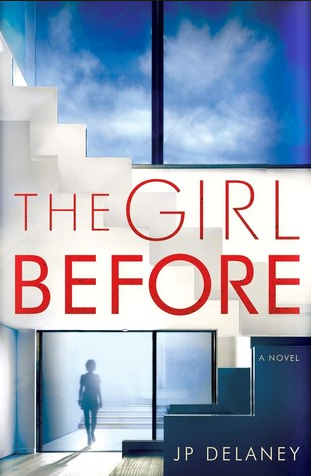The Girl Before
Please make a list of every possession you consider essential to your life.

There are a lot of ways to answer that question, and ultimately it matters if we mean essential to living, or essential to modern life. For example, I don’t have to have clothes depending on my situation, but because I have a job and I live in Ohio, I have to have clothes. How much I have is up to me, but I definitely have to have something. I would also include a laptop/tablet/phone on that list, because you have to be able to be reachable for work and by family. But I totally get the point, and that’s how The Girl Before begins.
Apparently, I have a different perspective than most, because I still believe The Circle is the greatest thing ever and I would totally sign up for it today. While reading The Girl Before, I also found myself craving minimalism and how nice it would be to not have a thousand items cluttering up your space and your life. Plus, a super tech-centric home would be amazing — anyone who disagrees is wrong. Sorry, just wrong.
Telling the story from multiple voices would not have been my choice, but for this book it works because we’re living the story on two different timelines. It actually makes for a much creepier story when identical phrases are used. The author doesn’t tell you the exact timeline, but it’s easy to deduce after awhile. The identical phrases is great because we know the truth but we can’t do anything to help when we think we’ve figured out the ending.
The characters are relatable to a point, and it definitely made me question myself for sometimes rationalizing certain behavior — “We’re all guilty of dropping into the same familiar phrases, the same linguistic shortcuts” (Delaney, 150) — when in reality, that should be a huge red flag if you find out your boyfriend used the same words with you as another girl. Especially once you find out she died.
There were at least three or four OMG moments where the story changed from what I expected, and that’s nice. Any more than that and it would have been unbelievable, any fewer and I would have lost interest.
Dialogue without quotations is difficult to read because we aren’t used to it. However, I found that I read more carefully because I had to note each word rather than fly past filler phrases like “she said,” and it made me savor the book.
The ending was a surprise, like all of these “psychological-thriller-what’s-happening-oh-wait-I-get-it-no-I-don’t-oh-no-now-it’s-over-and-I’m-sad-but-sleeping-with-one-eye-open-tonight” books, but it almost seemed rushed, like the author was done with the story twenty pages ago but had to finish the story anyway. I read online this was optioned as a movie, and that definitely makes sense, with the back and forth between two characters in time. The main character was a little too Christian Grey for my taste, but with the minimalist thing, it was different enough to work. Definitely worth a read, would also be a great book club book.
Comments
Post a Comment